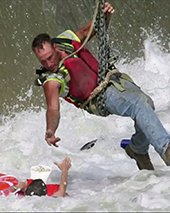There are the obvious examples of courage, such as the soldier who runs into live fire to rescue his buddy, or the subway bystander who jumps down onto the tracks to save a child who has fallen from the platform. All of us would like to think we’d show the same type of selfless action if we were in a similar circumstance, but most of us will never find out.
While we aren’t confronted with life and death situations very often, Brené Brown, a research professor at University of Houston who specializes in the study of vulnerability and courage, believes that at the heart of courage is the willingness to be vulnerable, including being willing “…to ask for what you need… to talk about how you’re feeling… to have the hard conversations.” It takes courage to tell a friend or loved one a hard truth, or to admit that you made a serious mistake, or to speak up for what you think is right even when you think you stand alone.
A Spanish bullfighter, when referred to as being “fearless”, said “I am not fearless. To fight a bull without fear is dangerous and stupid. And to not fight a bull because you have fear is nothing. But to fight a bull with fear — that is something!”
- anonymous
The difficult thing is that vulnerability is the first thing I look for in you and the last thing I’m willing to show you. In you, it’s courage and daring. In me, it’s weakness...
Vulnerability is about showing up and being seen. It’s tough to do that when we’re terrified about what people might see or think. When we’re fueled by the fear of what other people think or that gremlin that’s constantly whispering “You’re not good enough” in our ear, it’s tough to show up.
- Brene Brown, from the Forbes interview.
When we come face-to-face with the fear and pain in our psyche, we stand at the gateway to tremendous renewal and freedom. ... When we stop fighting the energy that has been bound in fear, it naturally releases into the boundless sea of awareness. The more we awaken from the grip of fear, the more radiant and free becomes our heart.
- from Radical Acceptance by Tara Brach
It’s not the critic who counts; not the man who points out how the strong man stumbles or where the doer of deeds could have done them better.
The credit belongs to the man who is actually in the arena, whose face is marred by dust and sweat and blood; who strives valiantly . . . who at best knows the triumph of high achievement and who at the worst, if he fails, at least fails while daring greatly.
- Theodore Roosevelt
The first time I read this quote by Theodore Roosevelt (above), I thought, this is vulnerability. Everything I’ve learned from over a decade of research on vulnerability has taught me this exact lesson. Vulnerability is not knowing victory or defeat, it’s understanding the necessity of both; it’s engaging. It’s being all in.
I think the first thing we have to do is figure out what’s keeping us out of the arena. What’s the fear? Where and why do we want to be braver? Then we have to figure out how we’re currently protecting ourselves from vulnerability. What is our armor? Perfectionism? Intellectualizing? Cynicism? Numbing? Control? That’s where I started. It’s not an easy walk into that arena, but it’s where we come alive.
- from a Forbes interview of Brené Brown
A friend was telling me about her elderly parents in Florida. They live in an area where there’s poverty and hardship; the threat of violence seems very real. Their way of relating to this is to live in a walled community protected by guard dogs and electric gates. It is their hope, of course, that nothing scary will enter. Unfortunately, my friend’s parents are becoming more and more afraid to go outside those walls. They want to go to the beach or the golf course, but they’re too scared to budge. Even though they now pay someone to do their shopping, the feeling of insecurity is getting stronger. Lately they’ve become paranoid even about those who are allowed through the gates: the people who fix broken appliances, the gardeners, the plumbers, and the electricians. Through their isolation, they are becoming unable to cope with an unpredictable world….
As Albert Einstein pointed out (see quote below), the tragedy of experiencing ourselves as apart from everyone else is that this delusion becomes a prison. Sadder yet, we become increasingly unnerved at the possibility of freedom... Finding the courage to go to the places that scare us cannot happen without compassionate inquiry...
- from The Places That Scare You: A Guide to Fearlessness in Difficult Times by Pema Chodron
A human being is a part of the whole, called by us "Universe", a part limited in time and space. He experiences himself, his thoughts and feelings as something separated from the rest — a kind of optical delusion of his consciousness. This delusion is a kind of prison for us, restricting us to our personal desires and to affection for a few persons nearest to us. Our task must be to free ourselves from this prison by widening our circle of compassion to embrace all living creatures and the whole of nature in its beauty. Nobody is able to achieve this completely, but the striving for such achievement is in itself a part of the liberation and a foundation for inner security.
- Albert Einstein



